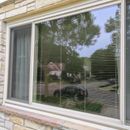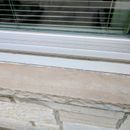Where should I caulk the exterior of these windows?
The thin-coat plaster blistered up through the paint just below the window apron in our 1938 house. I removed the loose plaster and patched and repainted an area of about 2 square inches. The bulging plaster seemed quite dry despite recent rains. I’m guessing the damage was due to rain, perhaps wind-driven rain. Climate zone is 6A if that matters.
There’s no caulk between the aluminum wrapped window and the stone sill below it. Should I caulk it, or might that block drainage? The stone sill slopes, which isn’t obvious from the picture.
If I caulk the bottom, should I leave some weep holes, just in case? I plan to re-caulk the top and sides of the exterior window frames in any case, even though it doesn’t look too bad.
Thanks in advance. Martin was spot on in diagnosing my last water intrusion problem (leaks in low pitch roof were causing brown water to trickle down side jambs of sun porch windows). Replacing shingles with rubber roof solved it.
Jonathan
GBA Detail Library
A collection of one thousand construction details organized by climate and house part












Replies
Jonathan,
You are right to ask the question. Caulking around the exterior of windows, especially at the sill, usually creates more problems than it solves.
There are a lot of variables here, and we don't know how your window rough opening was flashed. If you are getting water intrusion on the interior, that's not good. It's probable that (a) your window rough opening was never flashed, and (b) wind-driven rain is entering near your window. We just don't know if the water is entering at the window head, the window jambs, or the window sill. In many cases, water enters at the jambs, and shows up at the lower corners.
Tough to fix. Water may even be getting behind the stone veneer (especially if this is a gable end). Ideally, you would rip out the whole window so that the rough opening could be properly flashed.